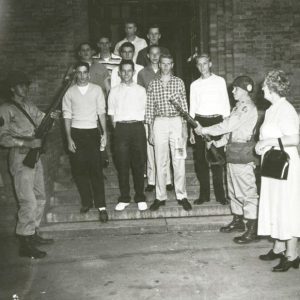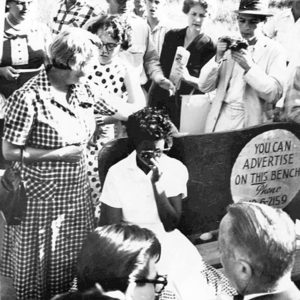calsfoundation@cals.org
Grace Lonegran Lorch (1903–1974)
Grace Lorch, wife of Philander Smith College mathematics professor Lee Lorch, was a civil rights and labor rights activist. She is best known for lending aid to one of the Little Rock Nine during the Central High School desegregation crisis in 1957.
Of Irish extraction, Grace Lonergan was born on September 26, 1903, to William and Delia Lonergan in Boston, Massachusetts. She and her brother Thomas grew up in a working-class household in which her father was a railroad worker and her mother was a homemaker.
Grace Lonergan became a public school teacher at a young age. She was a member of the Boston Teachers’ Union and the Boston Central Labor Council. After she married Lee Lorch in December 1943, she filed an appeal against a nineteenth-century school board ruling that stated that full-time female teachers could not be married. Although her appeal was not successful, it set the stage for challenges by other Boston teachers and, eventually, reversal of the rule by the Massachusetts legislature.
Grace Lorch was active in leftist causes, although it is unclear if she was ever a member of the U.S. Communist Party (CPUSA). When the Lorches lived in a segregated New York City housing project owned by the Metropolitan Life Insurance Company after World War II, she took part in protests by fellow white tenants. During the time her husband worked at Fisk University in Nashville, Tennessee, from 1950 to 1955, the couple’s formal request that their daughter, Alice, be allowed to attend a black elementary school was denied by public school authorities.
The Lorches became active supporters of the black civil rights movement in Little Rock (Pulaski County) after moving there in 1955. They lived in the city’s black community and were neighbors of Daisy Bates and L. C. Bates, civil rights activists and publishers of the Arkansas State Press. A request that Alice be allowed to attend a black elementary school in Little Rock was denied by the school board.
On the morning of the Little Rock Nine’s first—and unsuccessful—attempt to enter Central High, Elizabeth Eckford was surrounded by a hostile white crowd at a bus stop near the school. Lorch came to her aid. As New York Times reporter Benjamin Fine related, “Suddenly, I saw a white-haired, kind-faced woman fighting her way through the mob. She looked at Elizabeth, and then screamed at the mob, ‘Leave this child alone! Why are you tormenting her? Six months from now, you will hang your heads in shame.’” Eckford recalled that Lorch “put me on the bus and sat next to me. She asked my name and tried to talk to me but I don’t think I answered.”
Lorch and her husband were harassed by “anticommunist” investigative commissions at the federal and state levels of government. Three weeks after the Eckford incident, Lorch was summoned to testify before a hearing of the U.S. Senate Internal Security Subcommittee (SISS) in Memphis, Tennessee, about her relationship with the CPUSA in Boston. When Senator James Eastland asked if she was a communist, she broke her silence to say, “We all know well what Mr. Eastland means by communism.” In an attempt to gather information about Lorch’s past, the SISS contacted Massachusetts police officials several weeks later.
When the Lorches lived in Little Rock, Arkansas attorney general Bruce Bennett attempted to develop a case against them based on the 1951 Communist Registration Act. In addition to investigations by the Special Education Committee of the Arkansas Legislative Council, Governor Orval Faubus accused the Lorches of being “subversives.” Congressman Thomas Dale Alford denounced Grace Lorch as a “Communist functionary” on the floor of the U.S. House of Representatives in early 1959.
Due to pressures caused by official harassment and Lee Lorch’s persistent job insecurity, the Lorches left Little Rock in the spring of 1958. Lee Lorch was employed for one year at Wesleyan University in Connecticut. By the fall of 1959, they were living in Canada. Shortly after they moved there, Attorney General Bennett gave his blessing to a scheme to supply Canadian police officials with information about them.
Grace Lorch died on October 28, 1974, and is buried in Dudley, Massachusetts. Lee Lorch died in 2014.
For additional information:
Alice Lorch Bartels Interview. Butler Center for Arkansas Studies. Central Arkansas Library System, Little Rock, Arkansas. https://cdm15728.contentdm.oclc.org/digital/collection/p1532coll1/id/13228/rec/1 (accessed February 28, 2024).
Bates, Daisy. The Long Shadow of Little Rock: A Memoir. New York: David McKay Company, 1962.
Iggers, Wilma, and Georg Iggers. Two Lives in Uncertain Times: Facing the Challenges of the 20th Century as Scholars and Citizens. New York: Berghahn Books, 2006.
Katagiri, Yasuhiro. Black Freedom, White Resistance, and Red Menace: Civil Rights and Anticommunism in the Jim Crow South. Baton Rouge: Louisiana State University Press, 2014.
Margolick, David. Elizabeth & Hazel: Two Women of Little Rock. New Haven, CT: Yale University Press, 2011.
Newkirk, Anthony B. “Lee and Grace Lorch in Little Rock, 1955–1958.” Pulaski County Historical Review 64 (Fall 2016): 96–111.
———. “‘The Long Reach of History’: The Lorches and Little Rock, 1955–1959.” Arkansas Historical Quarterly 76 (Autumn 2017): 248–267.
Stockley, Grif. Daisy Bates: Civil Rights Crusader from Arkansas. Jackson: University Press of Mississippi, 2005.
York University: News from the Clara Thomas Archives & Special Collections. “Black History Month Featured Fonds: Lee and Grace Lorch.” http://deantiquate.blog.yorku.ca/2012/02/24/bhm2012_leeandgracelorch/ (accessed September 2, 2021).
Anthony B. Newkirk
Philander Smith College
 Civil Rights and Social Change
Civil Rights and Social Change World War II through the Faubus Era, 1941 through 1967
World War II through the Faubus Era, 1941 through 1967 Grace L. Lorch and Students
Grace L. Lorch and Students  Grace Lorch and Elizabeth Eckford
Grace Lorch and Elizabeth Eckford 




Comments
No comments on this entry yet.